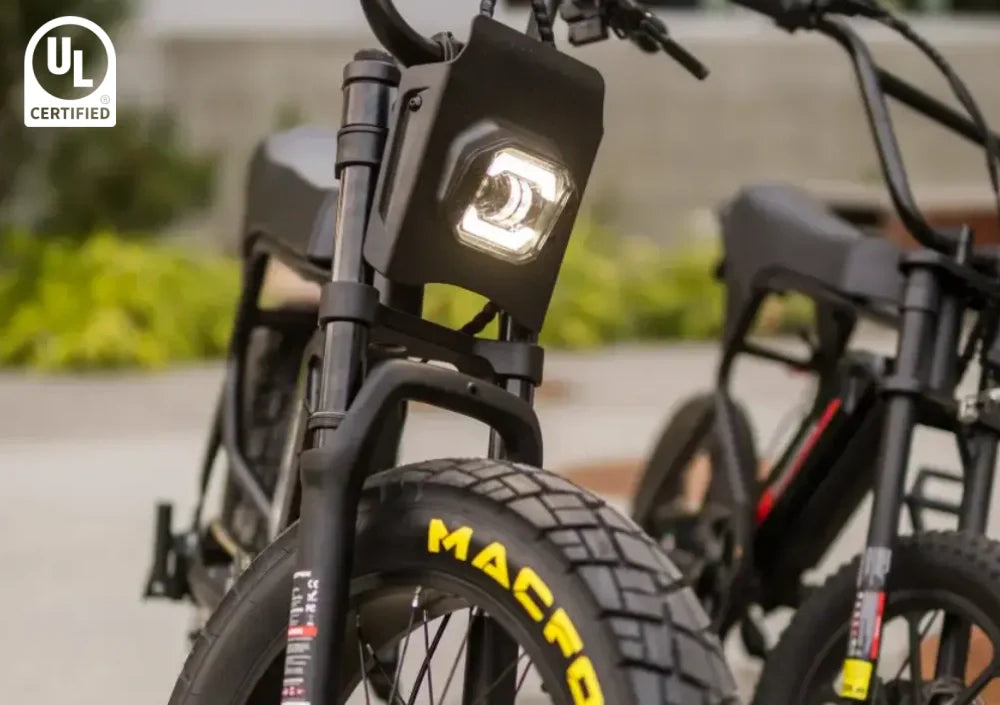Electric bicycles are actually not complicated; you can think of them as "a bicycle amplified by electricity." Their three main components are: the motor, the battery, and the controller. The battery provides power, the motor assists you while you ride, and the control system determines when and how much assistance the motor provides based on your pedaling. You can adjust the level of assistance and check the battery level and speed using buttons on the handlebars.
How do Electric Bikes Work
When you start pedaling or twisting the throttle, the controller, acting as the central hub, takes power from the battery based on the pedaling or throttle signals collected by the sensors, and drives the motor to provide assistance. The harder you pedal or the higher the assist level you select, the more power the motor provides; when you stop pedaling or brake, the system immediately cuts off the motor output to ensure safe and controllable riding. Therefore, an electric bicycle is more like "giving you a push" while you ride, rather than completely riding for you.
The Three Key Components of an Electric Bike
Understanding these three core components will help you choose the right electric bike and ride it more effectively.
Controller
The electric bike controller can be thought of as the bike’s “brain.” It receives input from sensors—such as whether you are pedaling, how much force you are applying, and which assist level is selected—and then draws power from the battery to precisely control how much motor assistance is delivered, when it starts, and when it stops.
Riders can improve performance and efficiency by using assist levels and riding techniques correctly. In real-world riding:
-
Start in a low assist level so the controller engages the motor more gently
-
Once your speed stabilizes, gradually increase assist as needed
-
Use low to mid assist levels for flat cruising
-
Increase assist temporarily for hills, headwinds, or carrying extra weight
When starting or riding at low speeds, avoid sudden hard pedaling or abrupt throttle input, giving the controller time to smooth out power delivery. When braking, slow down in advance and allow the controller to cut motor output smoothly. This results in a more comfortable, safer ride and better battery efficiency.
Motor

The motor provides additional power to the wheels when you pedal (or use the throttle), making riding easier. You can think of it as someone gently pushing you from behind.
Most electric bike motors are relatively moderate in power, typically ranging from 250W to 750W. High-performance or sport-oriented models may exceed 1000W, but it’s important to note that bikes over 750W may no longer be legally classified as electric bicycles in many regions.
Motor placement varies:
-
Rear hub motors are the most common. They offer better stability and control, with power delivered from the rear wheel—similar to being pushed forward. This results in smoother starts, more natural acceleration, better traction, and less wheel slip. Rear hub motors are well suited for use with commuter electric bikes, light climbing, and occasional cargo carrying.
-
Mid-drive motors, mounted at the bottom bracket, work directly with your pedaling and use the bike’s drivetrain and gears. This allows them to take advantage of gear ratios, making them especially popular on electric mountain bikes, cargo e-bikes, and mid-to-high-end models.
-
Front hub motors exist but are less common.
Battery

The battery is the core power source of an electric bike. Most modern e-bikes use lithium batteries, which are available in two main installation types:
-
Removable batteries, which are easier to charge and help with theft prevention
-
Integrated batteries, which offer a cleaner appearance and better weight distribution
Battery capacity is typically measured in watt-hours (Wh), with common capacities ranging from 300Wh to 750Wh. The higher the capacity, the longer the theoretical riding range.
Lithium Batteries
Lithium batteries have become the mainstream choice for electric bikes due to their high energy density, light weight, and long cycle life.
Under the same size or weight conditions, lithium batteries can store more energy (higher Wh), which directly translates into longer range and better bike handling. They also offer high charge and discharge efficiency and degrade more slowly over time, allowing for more full charge cycles.
For these reasons, lithium batteries provide better long-term value and riding experience, making them the standard choice for mid- to high-end electric bikes.
Lead-Acid Batteries
The main reason lead-acid batteries still exist is their low manufacturing cost. However, they have clear drawbacks: low energy density, heavy weight, and short cycle life.
To achieve the same range, lead-acid batteries require significantly more volume and weight, increasing the overall burden on the bike and negatively affecting stability and handling. They also degrade faster, with noticeable range loss over time. As a result, lead-acid batteries are gradually being replaced by lithium batteries in electric bikes where performance and ride quality matter.
How to Ride an Electric Bike
First, familiarize yourself with the assist modes. Most electric bikes offer 3 to 5 assist levels, ranging from low to high.
For beginners, the following approach works well:
-
Starting or riding slowly: use low assist (levels 1–2) for smoother, more controllable acceleration
-
Normal cruising and daily commuting: use mid-level assist (levels 2–3) for a good balance of effort and stability
-
Climbing hills, riding into headwinds, or carrying loads: temporarily switch to higher assist (levels 4–5) to get through with ease
Pedal Assist vs. Throttle

Electric bikes typically use one of two assistance methods: Pedal Assist or a Thumb Throttle.
If you want riding to still feel like cycling—just with less effort—pedal assist is the best choice. As soon as you start pedaling, the motor supports your effort, and you can fine-tune the assistance using different levels. The result feels natural and easy to control, making it ideal for daily commuting, weekend rides, and riders who want exercise along with assistance.
Many riders notice that different e-bikes feel very different when the motor assistance kicks in. Some feel jerky or abrupt, while others feel extremely smooth and natural. This difference mainly comes down to the type of sensor used:
-
Cadence sensors simply detect whether you are pedaling, resulting in more direct and sometimes less refined assistance
-
Torque sensors measure how hard you are pedaling and deliver proportional assistance in real time, creating smoother, more responsive support that feels closer to traditional cycling
If you prefer a more effortless experience, a thumb throttle may suit you better. When starting from a stoplight, climbing a hill, carrying cargo, or when your legs feel tired, a simple press lets the bike move forward on its own. It’s convenient and energy-saving, especially for short trips and frequent stop-and-go riding.
Can You Wash an Electric Bike?
Yes. Like any bicycle, an electric bike can be washed. However, it’s important to use low water pressure and avoid spraying water directly onto the battery or electrical connections. You can cover the battery and exposed connectors with tape beforehand for extra protection.
For more details, please refer to our article:
“How to Wash Your E-Bike: A Simple and Effective Guide.”
















